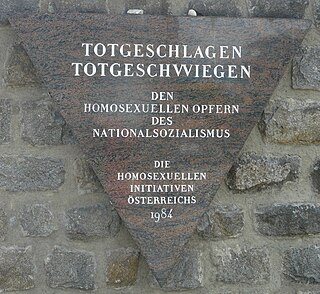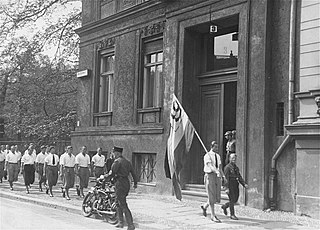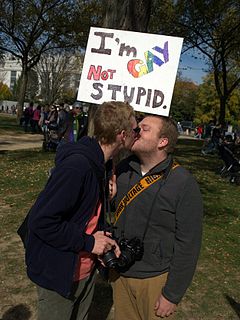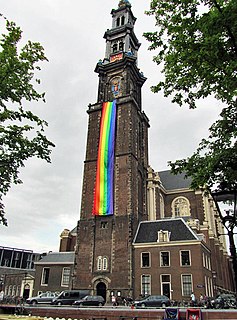
Under the rule of Nazi Germany from 1933 to 1945, gay men and lesbians were persecuted with thousands of gay men imprisoned in Nazi concentration camps.

Magnus Hirschfeld was a German physician and sexologist educated primarily in Germany; he based his practice in Berlin-Charlottenburg during the Weimar period. An outspoken advocate for sexual minorities, Hirschfeld founded the Scientific-Humanitarian Committee. Historian Dustin Goltz characterized this group as having carried out "the first advocacy for homosexual and transgender rights". "Hirschfeld's radical ideas changed the way Germans thought about sexuality." Hirschfeld was targeted by Nazis for being Jewish and gay, he was beaten up by völkisch activists in 1920, and in 1933 his Institut für Sexualwissenschaft was sacked and had its books burned by Nazis. He was forced into exile in France, where he died in 1935.
This is a list of notable events in the history of LGBT rights that took place in the 20th century before 1949.

Paragraph 175 was a provision of the German Criminal Code from 15 May 1871 to 10 March 1994. It made homosexual acts between males a crime, and in early revisions the provision also criminalized bestiality as well as forms of prostitution and underage sexual abuse. All in all, around 140,000 men were convicted under the law.

Adolf Brand was a German writer, egoist anarchist, and pioneering campaigner for the acceptance of male bisexuality and homosexuality.

The Institut für Sexualwissenschaft was an early private sexology research institute in Germany from 1919 to 1933. The name is variously translated as Institute of Sex Research, Institute of Sexology, Institute for Sexology or Institute for the Science of Sexuality. The Institute was a non-profit foundation situated in Tiergarten, Berlin. It was headed by Magnus Hirschfeld. Since 1897 he had run the Wissenschaftlich-humanitäres Komitee, which campaigned on progressive and rational grounds for LGBT rights and tolerance. The Committee published the long-running journal Jahrbuch für sexuelle Zwischenstufen. Hirschfeld built a unique library on same-sex love and eroticism.

LGBT history dates back to the first recorded instances of same-sex love and sexuality of ancient civilizations, involving the history of lesbian, gay, bisexual and transgender (LGBT) peoples and cultures around the world. What survives after many centuries of persecution—resulting in shame, suppression, and secrecy—has only in more recent decades been pursued and interwoven into more mainstream historical narratives.

Terms used to describe homosexuality have gone through many changes since the emergence of the first terms in the mid-19th century. In English, some terms in widespread use have been sodomite, Sapphic, Uranian, homophile, lesbian, gay, effeminate, queer, homoaffective, and same-sex attracted. Some of these words are specific to women, some to men, and some can be used of either. Gay people may also be identified under the umbrella terms queer and LGBT.
LGBT rights opposition is the opposition to legal rights, proposed or enacted, for lesbian, gay, bisexual, and transgender people.

Lesbian, gay, bisexual and transgender (LGBT) rights in Germany have evolved significantly over the course of the last decades. During the 1920s and early 1930s, lesbian and gay people in Berlin were generally tolerated by society and many bars and clubs specifically pertaining to gay men were opened. Although same-sex sexual activity between men was already made illegal under Paragraph 175 by the German Empire in 1871, Nazi Germany extended these laws during World War II, which resulted in the persecution and deaths of thousands of homosexual citizens. The Nazi extensions were repealed in 1950 and same-sex sexual activity between men was decriminalized in both East and West Germany in 1968 and 1969, respectively. The age of consent was equalized in East Germany in 1989 and in unified Germany in 1994.

Different from the Others is a German film produced during the Weimar Republic. It was first released in 1919 and stars Conrad Veidt and Reinhold Schünzel. The story was co-written by Richard Oswald and Magnus Hirschfeld, who also had a small part in the film and partially funded the production through his Institute for Sexual Science. The film was intended as a polemic against the then-current laws under Germany's Paragraph 175, which made homosexuality a criminal offense. It is believed to be the first pro-gay film in the world.
The connection between left-leaning ideologies and LGBT rights struggles has a long and mixed history. Prominent socialists who were involved in early struggles for LGBT rights include Edward Carpenter, Oscar Wilde, Harry Hay, Bayard Rustin, Emma Goldman and Daniel Guérin, among others.

The Scientific-Humanitarian Committee was founded in Berlin on 14 or 15 May 1897, to campaign for social recognition of gay, bisexual and transgender men and women, and against their legal persecution. It was the first LGBT rights organization in history.
Ernst Burchard was a German physician, sexologist, and gay rights advocate and author. Burchard, who was gay, testified as an expert witness in several court cases involving prosecutions on grounds of Paragraph 175, which criminalized homosexual practices.
This is a list of notable events in the history of LGBT rights that took place in the 1970s.

This is a list of important events relating to the LGBT community from 1801 to 1900. The earliest published studies of lesbian activity were written in the early 19th century.
Communist attitudes towards LGBT rights have evolved radically in recent years. In the 19th and 20th century, communist states and parties varied on LGBT rights; some were among the first political parties to support LGBT rights while others persecuted LGBT people.

The history of lesbian, gay, bisexual and transgender people in the Netherlands has reflected the shades of tolerance or rigidity which were utilized by the rulers of the country at various periods in its history. Since World War II, the movement for LGBT rights has been galvanized by both events abroad and increasing liberalization domestically.
The following is a timeline of lesbian, gay, bisexual, transgender and queer (LGBTQ) journalism history.
The following is a timeline of lesbian, gay, bisexual, and transgender (LGBT) history, in the 20th century.














